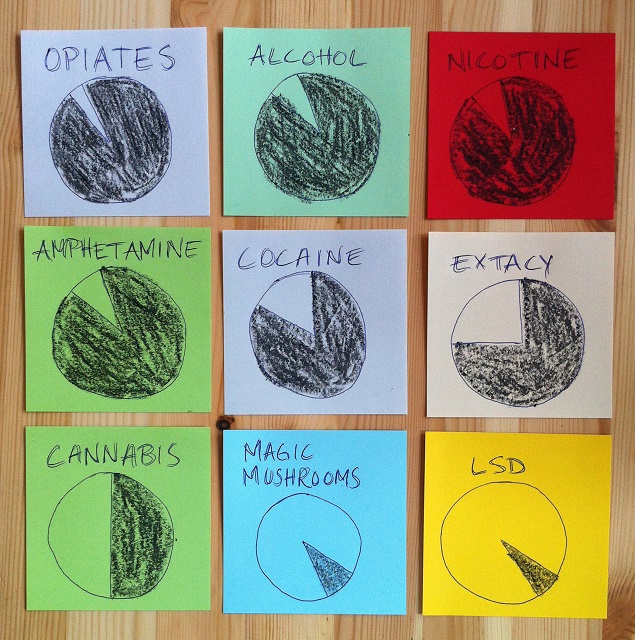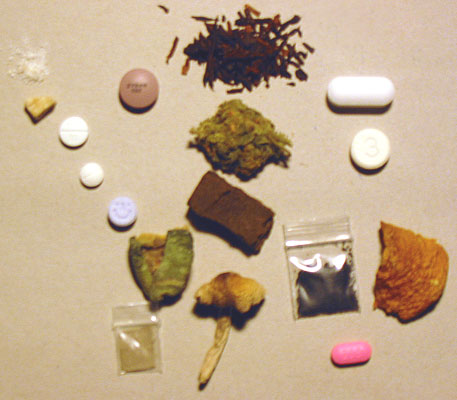Let me start off by saying that I have no statistical evidence or scientific research to support my claims in this post.
I drew the fancy circle diagrams myself. I do however have a great interest in substances, substance abuse and healing after substance abuse, so I have spoken to very many active and former users to get their take on things.
Now while someone is still using a substance their mind is often set on defending it, that is defending their own behaviour, no matter if it is good or bad. Therefore active users don’t seem to give very balanced reports on their substance of choice.
When you are active it might also be very difficult to see all the negative effects of using.
My impression is that former moderate or heavy users of a substance will often give the most truthful descriptions, although many that have had painful experiences might hold a grudge towards the substance.
So what are people saying about their experiences afterwards?
Well, it is clear that there is a great difference between substances. Some substances are outright hated, while others are often spoken fondly of—even many years after having last used them. Some are mostly described in terms of being destructive, while others are hailed for their healing properties.
The circle diagrams are very simple. The black area is negative experience and the area not coloured is positive experience.
Let’s go through the list:
1. Opiates.
This is the group of substances that I know least about and also where I have met quite few former users.
Every former user I have met has however been quite or very negative towards the substance. The few positive things they have to say is that it was relaxing and as if entering into a dreamlike state—but it was at the same time deeply destructive and robbed them of their life. The substance itself wasn’t perceived as having taught them anything.
I haven’t actually met anyone that was positive to opiates, but I suppose there must be someone out there, so I gave the circle a small piece of white among all the darkness that these substances seem to come with.
2. Alcohol.
I have met very many former alcohol users and they are generally very negative to alcohol.
I am myself one of them.
Much in the same way as with opiates it is hard to see very much good in alcohol at all, other than it being a social lubricant. Most, if not all, people that I have spoken to have stopped using alcohol because they couldn’t handle the substance and the negative effects were too severe, including such things as loosing relationships and jobs, getting into fights and having serious accidents.
There are some former users that are quite forgiving, saying that they had a good time with the substance, but that it just got out of hand.
3. Nicotine.
With hindsight this seems to be the most unrewarding substance of them all.
It doesn’t seem to give the users anything more than being a social thing and a mild way to relax and/or focus. It is expensive in relation to what you get and is reported to be extremely addictive, right up there together with opiates. The ones that have something positive to say about the substance are the ones that didn’t really get hooked and that therefore also were let off easy.
The positive experiences are along the line of “it was something to do while chatting over a cup of coffee,” that is, not very meaningful at all.
4. Amphetamine.
The same seems to go for amphetamines—it isn’t the heavy users that have something positive to say about amphetamine, but rather the users that didn’t have it as their substance of choice. They are the ones that used it to pick themselves up after other experiences, to be able to get home or go to work.
The habitual users seem extremely negative to amphetamines and I have heard horrifying stories of sexual abuse in connection to (ab)using the substance. In much the same way as with alcohol or cocaine, amphetamines can be extreme ego boosters, making social interaction quite intolerable for people that are not on the same substance.
Many also report loosing empathy on the substance, thus enabling them to do things that they would otherwise find unmoral, such as stealing, fighting and being sexually aggressive. Some report that their creativity is considerably heightened on amphetamines and such.
5. Cocaine.
In many ways cocaine seems similar to amphetamines, but I find that there is a larger number of users that have something positive to say about the substance. It might be due to the fact that it is more expensive than amphetamines and lasts for a shorter period of time.
Although I have heard it said that cocaine is more physically addictive than amphetamines, the price and duration seems to keep the addiction down. Comparing the two, cocaine is compared to a Mercedes or a Jaguar, while amphetamines are seen as a Fiat.
Even if you do crash your car, you will certainly have more nice things to say about the ride if you were travelling in a posh car, than in a cheap rust bucket.
6. Extacy.
This is a tricky one, because it is very much about intention and mental stability.
All users have had wonderful experiences on MDMA (the key ingredient in Extacy). Mind states of love and empathy—being able to connect with others, to truly feel and have a genuine interest towards others. On the other hand, without direction, many have fallen into a habitual use where they have had quite a severe backlash of depression and such.
In some of the worse cases the users describe having lost several years of their life and not knowing what happened to them.
There is a group that seem to have no negative experiences afterwards, but those that gain the most from the substance are those that have an intention in using it. Users report having overcome such things as depression and PTSD with the help of Extacy (MDMA).
7. Cannabis.
Here comes the first of two big leaps.
I would say that the average former cannabis user is either quite negative to cannabis, or quite positive. There are some troubling stories out there, mostly having to do with becoming lazy, losing interest in life or lapsing into depression, but there are also the odd ones reporting that they have had episodes of psychosis.
On the other hand very many former users have very fond experiences on cannabis. “Everything is the same, but with a golden lining,” as one put it. Many say that cannabis has helped them open up to the mysteries of the universe, to their own feelings and that the substance has helped unleash their creative potential.
And although many of them quit because they were overusing, they still say that the substance has given very much more than it has taken.
8. Magic mushrooms.
The next big leap is when we come to the true psychedelics. I have spoken to very many that have used psychedelics, and the ones that no longer use them are mostly overwhelmingly positive. They thank psychedelics for all sorts of healing in their life—from trauma, to addiction, to depression, to physical well being. They speak about insights that have helped them grow and become a better person.
A few have had hard or outright terrifying experiences, but many say that those experiences have been among the most rewarding. For example it might be horrible to confront the fact that you have been the victim of sexual abuse as a child, but that might also be what sparks a healing process.
The stories are quite similar between magic mushrooms and LSD, but magic mushrooms seem to offer a more mystic and unpredictable experience.
9. LSD.
It is common to find former users of psychedelics that simply say that they moved on. The substances have taught them what they needed and now they have gone on to work in other ways, with tools such as yoga, meditation or a spiritual practice.
Most of them are still very thankful for the help the psychedelics have provided—even when they have moved on.
There are however a few that don’t end their use of psychedelics on an up note. They might have had wonderful trips to start off with, but end up having miserable trips, getting lost in the enormity of the experiences or having unwelcome flashbacks—that is revisiting altered states without wanting to.
What does all this tell us? This post doesn’t have the ambition to go in depth with that question—but some things are quite obvious right off the bat.
The drug laws seem to be back to front. The most harmful substances, where former users report the least positive effects, are legal or in some form available as medications (opiates, alcohol, nicotine, amphetamine). Meanwhile the substances that former users are most positive to are strictly illegal, with the exception of the recent trend of decriminalization of cannabis.
There is a significant difference in how habitual users quit a substance, which is mirrored in how positive they are towards it afterwards. Substances that are heavily physically addictive (such as opiates, alcohol and nicotine) are often hard to quit and leave the user holding a grudge and with a feeling of having lost something. Other substances are such that the user simply moves on, often to practices that don’t involve substances. In these cases there is a lingering gratefulness.
Love elephant and want to go steady?
Sign up for our (curated) daily and weekly newsletters!
Apprentice Editor: Jess Sheppard/Editor: Catherine Monkman
Photo: Courtesy of author, Wikipedia








Read 0 comments and reply